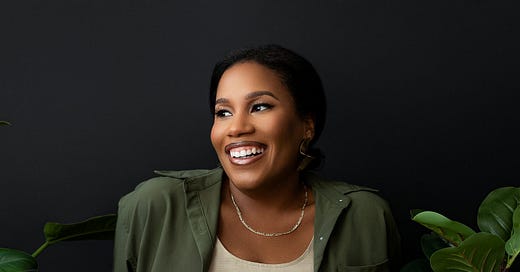Healing Through Story: How Books Become a Mirror for the Soul
Explore the transformative power of literature as a healing tool for Black women navigating trauma, identity, and reinvention.
Some books find us at just the right moment. They wrap around our wounds with words that feel like a balm. For many Black women, stories have always been more than entertainment—they’ve been lifelines, mirrors, and soft places to land. This summer, I’m reflecting on how fiction has helped me call my soul back to myself, and how the healing power of stories can gently shift our reality when we’re tired of surviving.
What Is Bibliotherapy—And Why Does It Matter?
In a recent conversation with Emely Rumble, a licensed clinical social worker and practicing biblio-therapist, we unpacked what bibliotherapy really is. It’s not just reading as self-care. Bibliotherapy is the intentional use of selected texts to support emotional healing, self-discovery, and personal development. Whether through poetry, memoir, or fiction, this practice helps us make sense of what’s fragmented and find language for what’s been buried.
How Trauma Fragments Us—and How Story Helps Reconnect
As Emely shared, trauma often fragments our mind and heart, scattering pieces of ourselves across time and experience. Healing, then, becomes the process of gathering those pieces, integrating what’s been disowned, denied, or dulled by pain. Stories, especially the ones that move us emotionally, can be the gentle tools we use to begin that reintegration. They allow us to witness our own survival in the narrative of someone else, and imagine new outcomes for our own.
Finding Language for Our Inner Lives
Growing up in a predominantly white area, books were often my only reflection. Characters like Jo March from Little Women or Elizabeth Bennet from Pride and Prejudice weren’t just literary heroines, they were mirrors. They gave me language for parts of myself I didn’t yet know how to name. I couldn’t have told you at 12 that I was fiercely independent, driven, maybe a little over-functioning, but I could say, “I’m like Jo.” And others would understand.
As I got older, I found myself in more culturally reflective texts. But the power was the same: stories gave me words I didn’t know I was missing. And in doing so, they gave me back pieces of myself.
Rereading as a Ritual of Return
Every year, I reread Their Eyes Were Watching God by Zora Neale Hurston. It’s more than tradition, it’s a spiritual practice. Janie’s journey, her softness, her independence, her return to self, it all felt like prophecy when I was 22. And now, reading it in my 40s, it feels like a homecoming.
Back then, I carried the last page in my purse like scripture. Now, I carry its lessons in my bones. Because that’s what good stories do: they live with you, evolve with you, and whisper different truths depending on what part of your healing you’re standing in.
Healing Isn’t Always Pretty, But It Is Possible
What I’ve come to understand—both as a therapist and a reader—is that healing isn’t always tidy. It’s often nonlinear, quiet, and deeply sacred. Emely said something that landed in my chest: “Healing isn’t always pretty, but it’s always holy.”
That truth has stayed with me. Because whether it’s a line in a poem or the arc of a fictional character, the right story at the right time can shift something inside us. It can nudge us back toward wholeness.
And that’s why I keep reading. That’s why I keep offering books to the women I work with. Because sometimes, when everything feels like too much, we need a sentence to hold onto. A phrase that reminds us who we are. A character who helps us believe we’re not alone.
Share Your Story
Now, I want to hear from you.
What’s one book that gave you language for your healing?
Drop it in the comments. We’re building a collective bookshelf of healing.
And if this resonated with you, forward it to a friend who needs a literary hug. Let’s keep each other soft.
P.S. Want to hear more? Check out the latest podcast episode with Emely Rumble—we go even deeper into the healing power of stories.
A Note on Substack
This space will always offer free support, stories, and strategy.
But when you become a paid subscriber, you help me continue creating high-quality, soulful content for Black women navigating burnout, ambition, and rest.
It’s $8/month—less than a fancy latte.
But it helps sustain everything I’m building here.
And I’m so, so grateful.





I loved every word of this. Books have been my lifeline thru my entire childhood and teen years. And because I didn’t have access to Black literature back then, books like Little Women, Pride and Prejudice, and Anne of Green Gables helped me make sense of the world and my feeling about it too. I will never stop reading fiction to heal myself.
I loved this article. We learned about bibliotherapy in grad school.
There are sooo many: Wilbur, Velveteen Rabbit, Anne, Wakefield Twins (Elizabeth), Firestarter, House Made of Stairs, Lord of the Flies, Thank you Dr. MLK, all had messages for me.